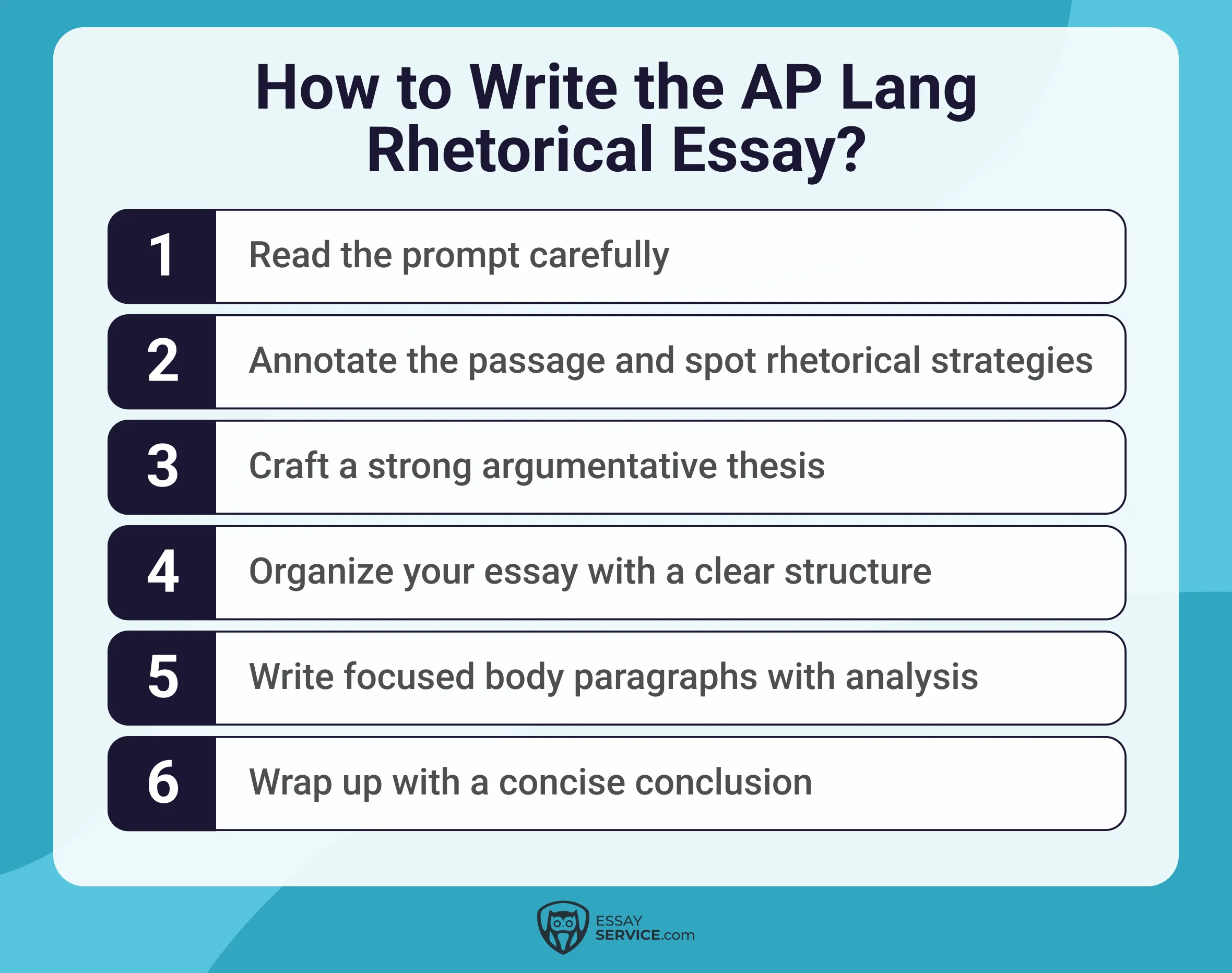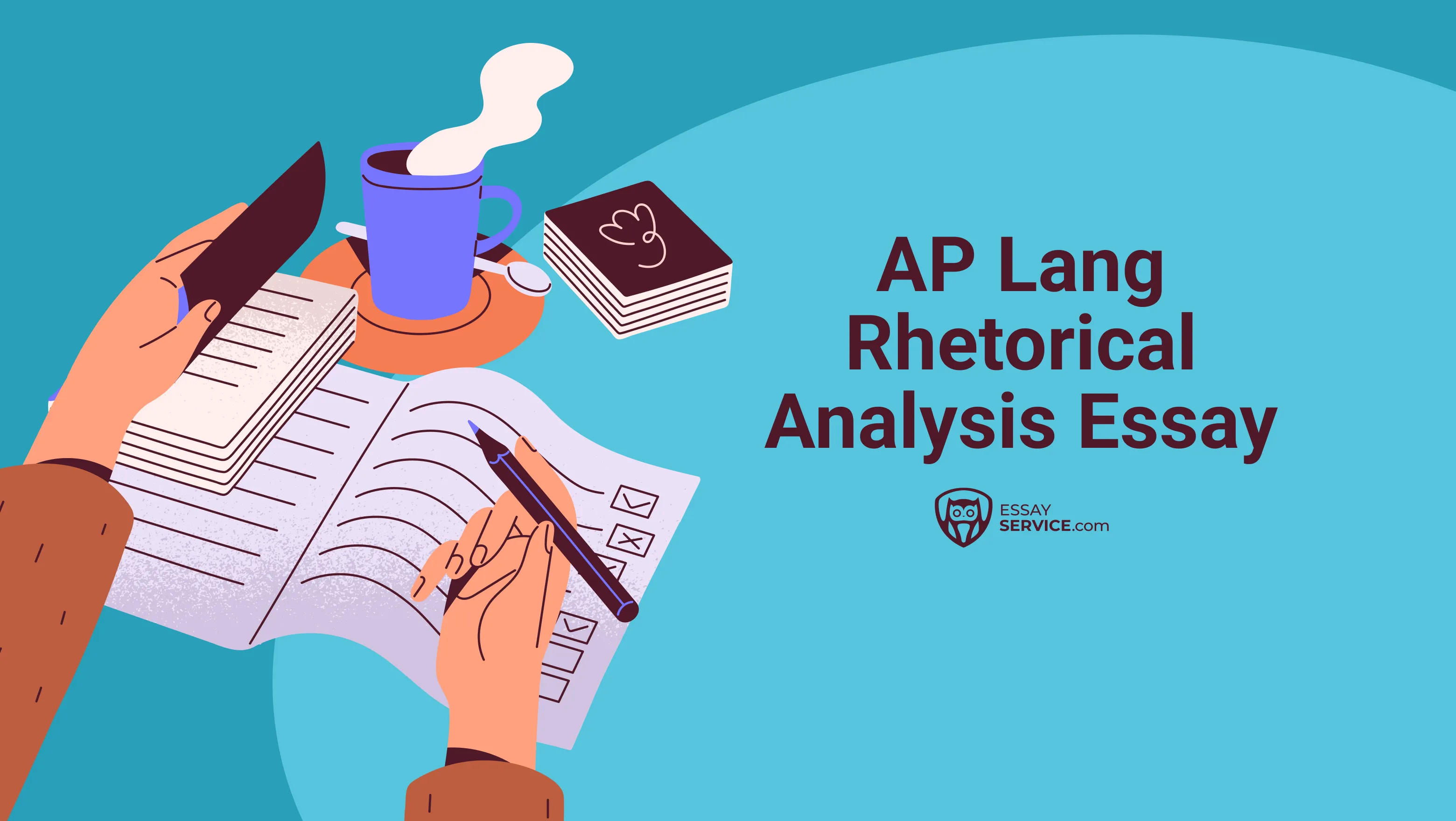The rhetorical analysis essay is one the main pieces of the AP English Language exam. Instead of just giving a summary, you'll show how an author uses words to sway the reader. You'll also look at the author's tone, word choice, setup, and ways of persuasion. You must think sharply and write clearly, which counts a lot.
This guide will explain how to write this type of task with an AP Lang rhetorical analysis essay example that illustrates the structure in action.
For those interested in additional support, our essay service is a trusted platform to help you make exam prep less overwhelming and more efficient!

What Is the AP Lang Rhetorical Analysis Essay?
The AP Lang Rhetorical Analysis Essay is one of three open-response parts on the AP English Language and Composition Exam. Here, you get a factual text (like a speech, article, or letter) and must examine how the author crafts an argument to persuade or teach their audience. You're not to agree or disagree with them, but to show how their approach impacts meaning and aids their aim.
This means you will check out rhetorical tools including the appeals to ethos, pathos, and logos. You need to show your understanding of both the devices used and their impact on the audience. An effective essay will balance summary with analysis: instead of merely referencing a rhetorical device, you will excavate its relevance to the author's argument.
AP Lang Rhetorical Analysis Essay Outline
Knowing what a rhetorical analysis essay is only the beginning. The real challenge is what we do with our ideas and how we lead the reader through our argument.
Let’s look at Martin Luther King Jr.'s Letter from Birmingham Jail as an organizational model.
See also: Rhetorical analysis essay outline.
How to Write the AP Lang Rhetorical Essay?
Outlining is only half the battle. The real challenge comes when you sit down and put pen to paper. Here’s how the process goes:

Let's break down these steps along with the tips for rhetorical analysis essay AP lang exam for better understanding.
Read the Prompt Carefully
The prompt tells you exactly what to do: analyze how the author builds an argument, not whether you agree. Slow down here. A quick reread ensures you catch important details like the type of text, the audience, and the writer's purpose.
Annotate the Passage
As you read, mark the text actively. Look for:
- Tone shifts (sarcastic, hopeful, urgent)
- Rhetorical appeals (ethos, pathos, logos)
- Stylistic devices (imagery, repetition, syntax)
Feel free to underline, jot notes in the margins, or mark patterns to see how the author is working to persuade.
Craft a Strong Thesis
Your thesis is the backbone of the essay. It should clearly state:
- The author's purpose.
- The main rhetorical strategies you'll analyze.
Example: "Through appeals to logic, a respectful tone, and historical references, the author defends the necessity of civic action."
Organize with a Clear Structure
Use the outline you've learned: introduction, 2–3 body paragraphs, conclusion. Keep it simple and logical. Each paragraph should tackle one strategy and tie back to your thesis.
Write Focused Body Paragraphs
Each body paragraph should follow a mini-structure:
- Topic sentence → strategy being discussed.
- Evidence → direct quote or paraphrase.
- Analysis → explain why it works and its impact on the audience.
- Link → tie back to thesis.
Avoid just naming devices. Go deeper and explain the effect and purpose.
Wrap Up with a Concise Conclusion
Your conclusion should:
- Restate the thesis in fresh words.
- Sum up the strategies discussed.
- End with a broader reflection (why the text matters beyond its immediate moment).
Two to three sentences are enough, so keep it short.
AP Lang Rhetorical Analysis Essay Examples
Seeing how everything comes together is often the best way to learn. Below are three sample essays written in the AP Lang rhetorical analysis style.
The 6-Point Rubric for an AP Lang Rhetorical Analysis Essay
The rhetorical analysis essay is graded on a 6-point rubric divided into three categories:
- Thesis (1 point)
- Evidence and Commentary (4 points)
- Sophistication (1 point).
To maximize your scores, you need to understand what earns credit in each part.
Thesis (0–1 point)
Your thesis is the foundation. Without it, you can't build a strong essay. To get the point:
- Write a clear, defensible claim that states the author's purpose.
- Name at least two rhetorical strategies you'll analyze.
- Place it in the introduction (usually at the end).
✅ Max score tip: Avoid vague or summary-like statements. Don't just say "The author uses rhetorical devices." Instead, be specific: "The author appeals to logic, contrasts past and present, and uses a calm tone to highlight the urgency of climate action."
Evidence and Commentary (0–4 points)
This is where the bulk of your score comes from, up to four points. It's not enough to drop quotes; you must connect them back to your thesis.
To earn the full 4 points:
- Select precise evidence → well-chosen quotes or paraphrases that highlight key strategies.
- Provide commentary → explain how the evidence works, not just what it says.
- Stay focused → every example should tie back to the author's purpose.
- Balance summary and analysis → avoid retelling the text. Show insight instead.
✅ Max score tip: Think in terms of cause and effect. Instead of "The author uses imagery," write, "The stark imagery of 'a silent, suffocating crowd' evokes urgency and compels the audience to recognize the cost of inaction."
Sophistication (0–1 point)
This last point is awarded sparingly, but it's your chance to stand out. You earn it by showing depth, nuance, or strong control of language.
Ways to demonstrate sophistication:
- Address complexity → acknowledge multiple layers of the argument.
- Connect to broader context → link the text to historical, cultural, or contemporary issues.
- Use precise, confident prose → avoid repetitive or formulaic wording.
✅ Max score tip: Don't force it. Instead of cramming in big words, aim for clarity and insight. A concise, well-phrased sentence showing how the text's message resonates beyond its immediate moment often does the trick.
DON'Ts of an AP Lang Rhetorical Analysis Essay
Even strong writers slip up on this type of writing task. Knowing what not to do can save you valuable points. Here are the most common mistakes to avoid:
- Summarizing instead of analyzing → retelling the passage doesn't earn points.
- Being too vague → "The author uses rhetorical devices" is not specific enough.
- Forgetting the thesis → without a clear claim, your essay loses direction.
- Overloading with devices → naming every strategy without explaining its effect weakens your analysis.
- Skipping commentary → evidence alone won't score; you must connect it to purpose.
- Overcomplicating language → long, clunky sentences won't make your essay look sophisticated, but clarity will.
- Ignoring time management → spending too long on the intro or quotes leaves body paragraphs underdeveloped.
Final Remarks
The AP Lang rhetorical analysis essay preps you to write with precision. Each time you analyze an author's choices and explain the impact of them, you are developing skills that grow well beyond the classroom.
But no one masters this overnight. Practice, feedback, and guidance make the difference between a rushed essay and a polished one. That's where EssayService comes in! With expert help in your corner, including our admission essay writing service, you can make the studying process more efficient and far more productive.
Frequently Asked Questions
How Long Should an AP Lang Rhetorical Analysis Essay Be?
There's no set word count, but most high-scoring essays are about 3–5 well-developed paragraphs. That usually comes out to 500–700 words in exam conditions. Focus on depth, not length. Two strong body paragraphs with clear analysis will score higher than five rushed ones.
How to Write a Good AP Lang Rhetorical Analysis Essay?
A good essay does three things:
- Clear Thesis → directly states the author's purpose and strategies.
- Focused Analysis → uses precise evidence and commentary to show how strategies work.
- Strong Structure → introduction, 2–3 body paragraphs, and a concise conclusion.
How to Get 6 Points on an AP Lang Rhetorical Analysis Essay?
To hit the top score, you need to check every box of the rubric:
- Thesis (1 point): Specific and defensible.
- Evidence & Commentary (4 points): Multiple examples, consistently analyzed, all tied to purpose.
- Sophistication (1 point): Depth of thought, clarity of prose, and recognition of complexity.

Phil spends his working days teaching international trade. He contributes to our blog as a freelancer, leveraging his experience with MBA students to advise on academic writing, studying abroad, and securing funds.
- Thesis Statement Formula for AP English Rhetorical Analysis Essays. (2018, February 1). The Writing Center of Princeton. https://writingcenterofprinceton.com/thesis_statement_formula_for_ap_english_rhetorical_analysis_essays/
- Rhetorical devices - Using language effectively - AQA - GCSE English Language Revision - AQA. (n.d.). BBC Bitesize. https://www.bbc.co.uk/bitesize/guides/zc7nycw/revision/2
- Rhetorical Devices Rhetorical Devices. (n.d.). https://ed.sc.gov/instruction/standards/english-language-arts/instructional-resources/rhetorical-device-supplement/
New posts to your inbox
Your submission has been received!




